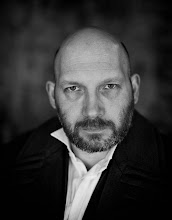
It sounds like an ironic title for a post, I know, but I’m actually very serious about the joys of the rewrite.
It’s a very rare thing for any writer to produce a perfect first draft and even if, like me, you redraft and correct things as you go along (which probably explains why it takes me so long to produce even a short story) chances are that something will need fixing after you have breathed that satisfied sigh and placed the words ‘The End’ at the end of the story.
In general, too, most editors will ask for some sort of re-write even after they have accepted a story – in fact sometimes as a condition of acceptance. I’ve usually found that the suggestions they make are spot on - or maybe I’ve been lucky in working with editors who understand what exactly it is I’m trying to do with a particular tale and are anxious to make it as good as it can possibly be.
Over the last year or so I’ve been asked by editors to rewrite stories for length, to reduce the overall level of violence (and, in one case, to actually increase it), to swap scenes to increase the pace of the story and even to change some of the character names and some minor story concepts. All of which I have done with great pleasure since, in most cases, the points made by the editors in question were absolutely right.
But, over and above the re-write to editorial demand, I think it’s important for writers to look back over their work and self-edit it. Rewrites can happen at a structural, conceptual, paragraph, sentence and even word level. It doesn’t necessary mean tearing down the story and starting from scratch, but rather it can often mean re-honing certain aspects of a story in order to make them clear (clear in this sense being a relative term, since I also firmly believe that there’s nothing wrong with making a reader work a little from time to time).
The amount of rewriting necessary will, of course, depend upon the story in question – sometimes a rewrite can be something as simple as taking out unnecessary repetition (I myself have the terrible habit of using the phrase ‘as if’ a little too often in first drafts) or even finding a better word to express exactly what you mean.
Some writers are afraid of the rewrite, worrying that it somehow might dilute the power of their original thoughts or visions, but as far as I’m concerned it is a necessary and, yes, joyful task.
Happy rewriting.
It’s a very rare thing for any writer to produce a perfect first draft and even if, like me, you redraft and correct things as you go along (which probably explains why it takes me so long to produce even a short story) chances are that something will need fixing after you have breathed that satisfied sigh and placed the words ‘The End’ at the end of the story.
In general, too, most editors will ask for some sort of re-write even after they have accepted a story – in fact sometimes as a condition of acceptance. I’ve usually found that the suggestions they make are spot on - or maybe I’ve been lucky in working with editors who understand what exactly it is I’m trying to do with a particular tale and are anxious to make it as good as it can possibly be.
Over the last year or so I’ve been asked by editors to rewrite stories for length, to reduce the overall level of violence (and, in one case, to actually increase it), to swap scenes to increase the pace of the story and even to change some of the character names and some minor story concepts. All of which I have done with great pleasure since, in most cases, the points made by the editors in question were absolutely right.
But, over and above the re-write to editorial demand, I think it’s important for writers to look back over their work and self-edit it. Rewrites can happen at a structural, conceptual, paragraph, sentence and even word level. It doesn’t necessary mean tearing down the story and starting from scratch, but rather it can often mean re-honing certain aspects of a story in order to make them clear (clear in this sense being a relative term, since I also firmly believe that there’s nothing wrong with making a reader work a little from time to time).
The amount of rewriting necessary will, of course, depend upon the story in question – sometimes a rewrite can be something as simple as taking out unnecessary repetition (I myself have the terrible habit of using the phrase ‘as if’ a little too often in first drafts) or even finding a better word to express exactly what you mean.
Some writers are afraid of the rewrite, worrying that it somehow might dilute the power of their original thoughts or visions, but as far as I’m concerned it is a necessary and, yes, joyful task.
Happy rewriting.


No comments:
Post a Comment